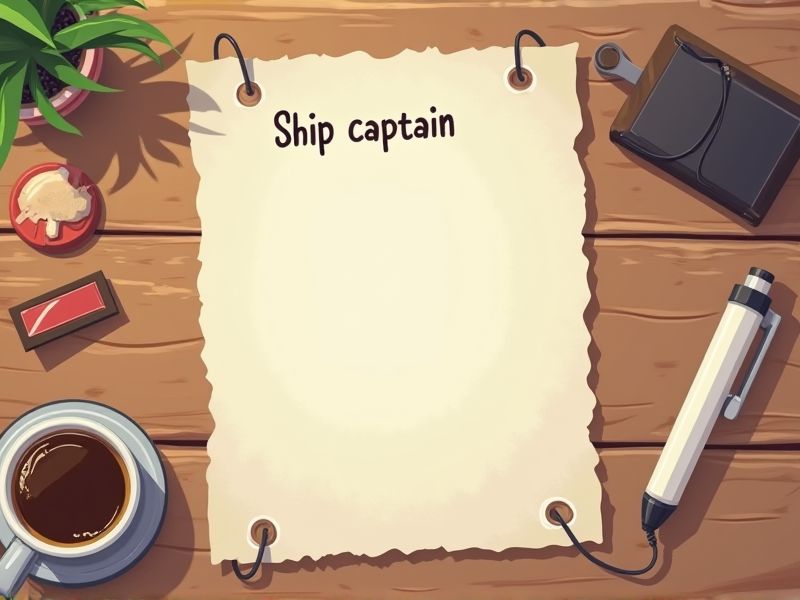
Ship captains carry the immense responsibility of ensuring the safety and efficiency of vessels navigating complex and often hazardous waters. To competently handle various maritime challenges, captains require specialized skills and knowledge, typically validated through certain key certifications. These certifications underscore a captain's proficiency in areas like navigation, safety management, and maritime laws. Some important certifications for aspiring ship captains include those related to navigational skills and safety protocols.
Merchant Mariner Credential (MMC) / Certificate of Competency (CoC) - Master Mariner
The Merchant Mariner Credential (MMC) or Certificate of Competency (CoC) - Master Mariner ensures that a ship captain meets the necessary qualifications and standards to safely operate a vessel. This certification provides assurance that the individual has undergone rigorous training and possesses the requisite knowledge of navigation, vessel operations, and maritime law. Holding an MMC or CoC is essential for compliance with international maritime regulations, reducing the risk of accidents and enhancing safety on the water. The credential serves as a recognized standard of professionalism and competence among global maritime professionals.
STCW Basic Safety Training Certificate
A captain must possess the STCW Basic Safety Training Certificate as it ensures they are trained to handle onboard emergencies efficiently. This certification mitigates risks related to fire, medical emergencies, and personal safety, directly impacting crew welfare and ship integrity. International regulations, such as those from the International Maritime Organization, mandate this certification for standardizing safety across global waters. Possession of the certificate boosts a captain's credibility and trustworthiness in the maritime industry.
STCW Advanced Firefighting Certificate
The STCW Advanced Firefighting Certificate equips ship captains with specialized skills to manage onboard fire emergencies, ensuring crew safety. This certification is a requirement under international maritime regulations, emphasizing the need for standardized safety measures. Without it, a captain may lack the authority to implement effective fire response strategies, compromising vessel integrity. Certification fosters preparedness and confidence, enabling a captain to lead decisive firefighting efforts under high-pressure conditions.
STCW Proficiency in Survival Craft and Rescue Boats Certificate
The STCW Proficiency in Survival Craft and Rescue Boats Certificate ensures a ship captain is competent in managing life-saving equipment during emergencies. It directly impacts the safety of all crew members and passengers by preparing the captain to effectively handle rescue operations. Meeting this standard reassures regulatory bodies and shipping companies of the captain's ability to comply with international safety requirements. Without this certification, a captain might be considered underprepared for emergency scenarios, potentially compromising lives and vessel integrity.
STCW Medical First Aid Certificate
The STCW Medical First Aid Certificate is required for ship captains because it equips them with essential skills to handle medical emergencies onboard, where immediate professional medical help is often unavailable. This certification ensures that captains can provide life-saving care and stabilize a patient's condition until further help is reached, reducing the risk of fatalities at sea. Additionally, maritime regulations mandate this certification to maintain safety standards and protect the welfare of crew and passengers. Possession of the certificate demonstrates the captain's competence in managing potential health crises, fostering confidence among the crew.
Global Maritime Distress and Safety System (GMDSS) Certificate
The Global Maritime Distress and Safety System (GMDSS) Certificate ensures a ship captain is proficient in handling communication equipment used during emergencies at sea, reducing the risk of maritime accidents. International regulations, such as SOLAS, mandate GMDSS certification to standardize safety protocols and ensure global cooperation. Possession of the certificate enhances a captain's ability to facilitate prompt rescue operations, preserving lives and cargo. Standardizing communication skills among captains increases maritime operational efficiency, vital for economic stability and environmental protection.
Bridge Resource Management (BRM) Certification
Improved decision-making skills in critical situations get enhanced through Bridge Resource Management (BRM) Certification. Effective communication and teamwork on the bridge reduce the risk of human error. Certification ensures adherence to international safety standards, minimizing operational incidents. Captains become more adept at utilizing available resources, leading to safer navigation and vessel management.
Advanced Navigation and Ship Handling Certificate
The Advanced Navigation and Ship Handling Certificate is required for ship captains to ensure safe and efficient vessel operations by deepening their navigation skills and understanding of complex maritime environments. This certification provides captains the ability to handle unforeseen challenges like adverse weather conditions and high-traffic routes, reducing the likelihood of accidents. Acquiring this credential demonstrates a captain's proficiency in advanced navigational technology, crucial for modern shipping. It also aligns with international maritime standards, fulfilling regulatory requirements for higher-level responsibilities.
Maritime Security Awareness (ISPS Code) Certification
Maritime Security Awareness (ISPS Code) Certification equips ship captains with the knowledge to effectively identify and respond to security threats, reducing risks posed to the vessel and its crew. This certification ensures compliance with international maritime safety regulations, fostering trust with regulatory bodies and stakeholders. Enhanced security measures through this certification lead to decreased incidents of piracy and terrorism, safeguarding global trade routes. Having a certified captain assures shipping companies of improved operational safety standards, which can influence insurance costs and liability concerns.
Maritime Environmental Protection and Compliance Certification
Maritime Environmental Protection and Compliance Certification ensures ship captains adhere to international regulations, reducing the risk of environmental damage. Certification enhances a captain's understanding of eco-friendly navigation practices, directly impacting marine ecosystem health. Obtaining certification can lead to reduced legal and financial liabilities for shipping companies. Ships captains with such certifications facilitate sustainable maritime operations, promoting long-term maritime industry's viability.
Summary
When you hire a ship captain with multiple certifications, their expertise and credibility enhance overall crew confidence and coordination. These certifications typically lead to improved safety practices, minimizing the risk of mishaps or accidents. Regulatory compliance becomes easier, reducing potential legal complications and delays. Profitability may increase as efficient and safe operations boost reputation and client satisfaction.
